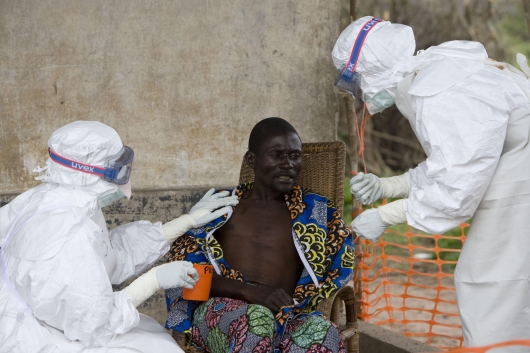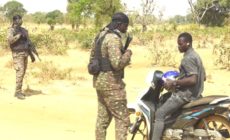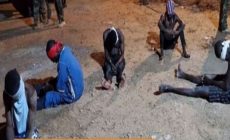The result, however, proved negative.
The victims are said to be a 16-year-old girl, a 56-year-old man and a 53-year-old driver, all of whom reported at the hospital with blood in their urine.
The driver, who reported with a fever, however, had blood in his faeces.
Speaking with the Daily Graphic on the suspected cases ahead of the screening, the Medical Superintendent of the Nsawam Government Hospital, Dr Kofi Ablorh, said out of the three patients, only one had been isolated for further tests and observations.
He said the other two did not have a history that supported the likelihood of an Ebola infection which would necessitate their being set apart.
“The other two have been excluded because they have other issues which have got nothing to do with Ebola. The travel history does not support it,” he said.
Dr Ablorh explained that if, for instance, a patient reported with a history of two weeks of excessive coughing, he or she would be screened for tuberculosis, which did not mean the patient had that disease.
He said if the cases had come last year, they would not have been news because there was no Ebola.
According to the medical superintendent, people who report at health facilities with blood in their urine have to be screened because “the index of suspicion is high (which is good) and, therefore, we need to make sure that we don’t get it”.
He said the patient who had been kept in isolation was doing well, adding that the hospital was equipped to deal with any eventuality.
Dr Ablorh, however, said the hospital was waiting for the requisite clothing which would be delivered Monday.
Interventions at Bawku
In another development, the Ghana Health Service (GHS) is still awaiting the test result of a Burkinabe who is suspected to have died of Ebola on arrival at the Bawku Presbyterian Hospital last Friday, reports Vincent Amenuveve from Bolgatanga.
Meanwhile, the Bawku and the Bolgatanga Municipal Health directorates have begun a series of sensitisation programmes on the Ebola viral disease (EVD) following the suspected case involving the Burkinabe.
The Bawku Municipal Health Director, Madam Rosemond Azure, told the Daily Graphic yesterday that her outfit had formed an Ebola Response Team to execute its preparedness plan to prevent residents of the area from being infected.
She said the team was made up of doctors, nurses, laboratory technicians, mortuary attendants, as well as officials from the medical stores and dispensary.
She stated that the sensitisation programmes had started with health personnel, schools, churches and mosques being educated on the EVD.
She said her outfit had also decided to ensure that information vans were sent round on market days to sensitise the people to the disease.
“In all of this, we are working with volunteers who are always on the ground,” she stated.
She pointed out that an isolated ward had been identified at the Bawku Presbyterian Hospital, while efforts were being made to pitch an Ebola camp outside the hospital to take care of patients of the EVD.
Madam Azure stated that although health personnel in the area had taken delivery of equipment such as goggles, aprons and nose masks, the items were inadequate.
“We have also distributed leaflets and other materials on the disease. Posters on the disease have also been produced and posted at vantage points to alert people,” she added.
Touching on activities at the various hospitals, the Bawku Municipal Health Director indicated that the hospitals had been told to ensure that they educated patients using their facilities on the disease on an hourly basis.
Porous borders
Madam Azure observed that there were many border security issues that needed to be looked at as the health authorities made efforts at preventing the risk of infection among residents.
She mentioned the porous nature of Ghana’s borders and the fact that some people entering the country from either Burkina Faso or Togo used unapproved routes.
In that regard, she stated that her outfit intended to meet assembly members and border officials later this week on how well to structure the border points to prevent the disease from entering the country.
She said, for instance, that the border points should be structured in such a way that port health officials would be the first people one would meet on entering the country.
Madam Azure said her outfit had also met with those engaged in the ‘Okada’ business along the borders to increase their awareness of the disease.
“We have a plan to go on air to talk about the border issues and educate the public on how best to prevent being infected by the disease,” she stressed.
Bolgatanga Health Directorate
Meanwhile, the Bolgatanga Municipal Health Director, Dr Thomas Mensah Afful, has, in a statement, advised residents of the area to report to the nearest health facilities “any sudden and early symptoms, such as flu-like illness, fever, muscle pain, fatigue, intense headache and sore throat”.
“During this trying and critical moment for the country, the Bolgatanga Municipal Health Directorate is calling for the support of our chiefs, religious and opinion leaders and the public to lead a crusade against the appearance of the EVD by taking elementary precautions,” it stressed.
It also advised residents to avoid habitats which might be populated by bats, such as caves, isolated shelters or mining sites.
The statement said residents were being educated on the need for them to “strictly follow hand-washing routines after visiting patients in hospitals, as well as after taking care of patients at home or shaking hands with friends or relations”.











 (Selorm) |
(Selorm) |  (Nana Kwesi)
(Nana Kwesi)